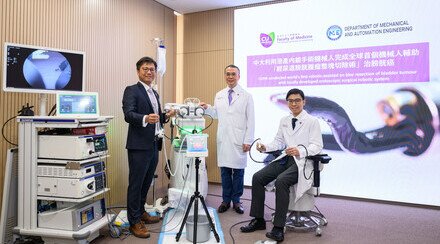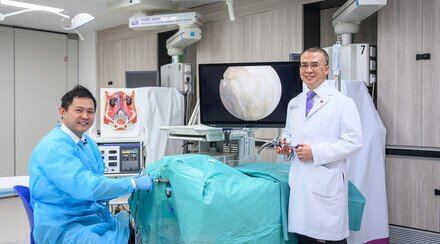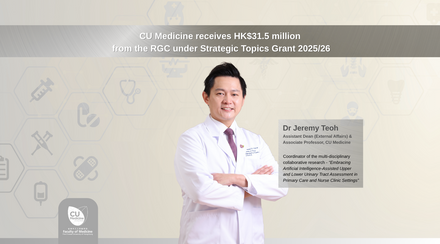CUHK Opens S.H. Ho Urology Centre to Promote Earlier Diagnosis and Management of Prostate Cancer to the Territory
With the generous donation from the S.H. Ho Foundation, the S.H. Ho Urology Centre at the Department of Surgery of The Chinese University of Hong Kong (CUHK) opened today (8 November). Officiating guests included Prof. Joseph J.Y. Sung, Vice-Chancellor and President, CUHK; Dr. David Tzu-cho Ho, Chairman, The S.H. Ho Foundation Limited; Dr. Tzu-leung Ho, Governor, The S.H. Ho Foundation Limited; Prof. Francis K.L. Chan, Dean, Faculty of Medicine, CUHK; Prof. Paul B.S. Lai, Chairman, Department of Surgery, CUHK; and Prof. Anthony C.F. Ng, Director, The S.H. Ho Urology Centre, Department of Surgery, CUHK. The key mission of the Centre is for the promotion of urological health in Hong Kong and regional area, through physicians and public education on urological diseases management, as well as basic and clinical research, in particular for the establishment of local Chinese experience and database in prostate cancer. Among all urological diseases, prostate cancer will be one of the main focused research areas of the Centre.

(From Left) Prof. Paul B.S. Lai, Chairman, Department of Surgery, CUHK; Prof. Joseph J.Y. Sung, Vice-Chancellor and President, CUHK; Dr. David Tzu-cho Ho, Chairman, The S.H. Ho Foundation Limited; Dr. Tzu-leung Ho, Governor, The S.H. Ho Foundation Limited; Prof. Francis K.L. Chan, Dean, Faculty of Medicine, CUHK and Prof. Anthony C.F. Ng, Director, The S.H. Ho Urology Centre, Department of Surgery, CUHK officiate the Opening Ceremony of The S.H. Ho Urology Centre.
Prostate cancer is the top leading cancer in Caucasian male and the third common cancer in Hong Kong male. The Urology Division of CUHK has conducted a study on the diagnosis of prostate cancer. The study reveals the Prostate Health Index (phi), a new test approved by the US Food and Drug Administration (FDA), improves diagnostic accuracy and hence avoids unnecessary interventional prostatic biopsy in Hong Kong population.
Prostate cancer is well known of its strong genetic predisposition in its development. Studies in Caucasian population had identified some genetic markers in association with the risk of prostate cancer. However, in a recent study involving more than 10,000 prostate cancer patients from the CUHK’s Urology Division and six other international institutes discovered that there are two genetic variants significantly associated with the occurrence of prostate cancer in the European-descent patients, but was not whereas identified in Hong Kong Chinese patients. The result suggested that these genetic variants are probably not related to the development of prostate cancer in Hong Kong population and may not be useful for predicting the individual risk of developing prostate cancer and its aggressiveness in Hong Kong population. Therefore, before further investigation, Hong Kong may still need to rely on current approaches for the diagnosis of prostate cancer. The research was published in the leading international journal Nature Genetics (2012; Issue No 44(12) p1326-9).
Prostate specific antigen testing (PSA-testing) is currently the main diagnostic tool for prostate cancer in Hong Kong. However, the use of PSA-testing for early prostate cancer detection is always criticized for its low predictive value which may lead to unnecessary prostatic biopsy. The Urology Division recently conducted a study on the effectiveness of Prostate Health Index (phi) in Hong Kong population. In the study of 230 patients who have slight elevated serum PSA level (4 – 10 ng/ml), the phi test can help to avoid more than 40% prostatic biopsy while maintaining a 90% sensitivity in diagnosing prostate cancer. The research validates the effectiveness of phi test in Hong Kong Chinese population, which can significantly decrease the number of invasive prostatic biopsy. In another CUHK study amongst patients diagnosed to have early prostate cancer in the past two years, the group noticed that only a small proportion of PSA test was initiated by routine body check, while the others were ordered by physicians during various medical consultations. This reflected that regular PSA-testing is not common in Hong Kong and the diagnosis of prostate cancer at early stage relies on physicians’ awareness and initiation.
.jpg)
Prof. Anthony C.F. Ng presents his recent study findings on the diagnosis of prostate cancer.
Prof. Anthony Ng, Professor of the Division of Urology, Department of Surgery at CUHK said, ‘With the aging population and westernization lifestyle, the incidence of prostate cancer will increase continuously. Our studies have shown that findings on Western population may not be directly applied to the Chinese or Asian population. Therefore, local investigations and validations have an important role on the development of prostate cancer diagnosis and treatment in Hong Kong. We are indebted to the S.H. Ho Foundation for its benevolence in opening of the S.H. Ho Urology Centre, which will continue our works on establishment of local database in prostate cancer and also education for the public and health care providers about the importance of earlier diagnosis and management of prostate cancer.’




















